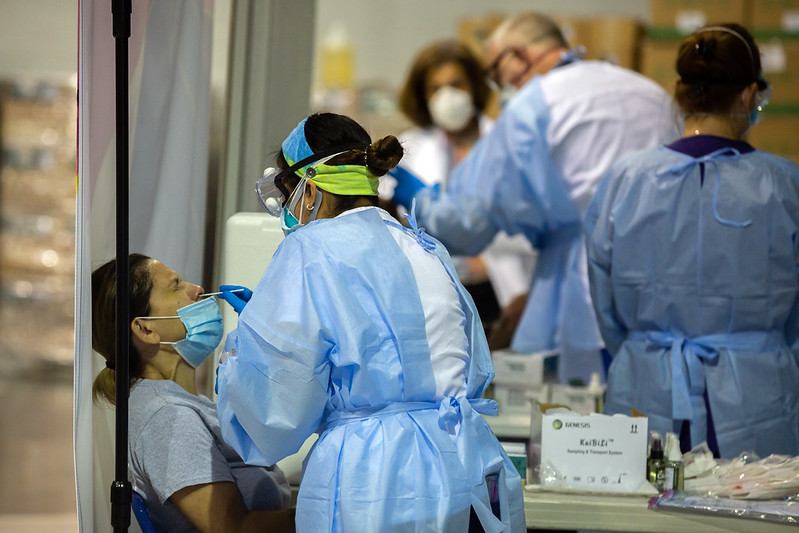
COVID-19 testing (photo: Stephen B. Morton/Governor's Office)
They wouldn’t have mattered before, but in 2020 my fatigue, chills, and cough came as a shock. I’d been careful, so much more careful than most. But even careful people catch COVID-19, so I got tested. Or, at least, I tried.
Putnam County may be just an hour north of New York City, but its COVID-19 testing infrastructure is months behind. There are no pop-up testing centers or public hospital sites. Instead, I spent hours navigating urgent care websites to get a telemedicine appointment, one of the infuriating prerequisites up here to an actual COVID-19 test.
The next morning, I prodded myself out of bed before dawn so I could be first in line at urgent care, and after a couple hours, my test was over. But that was when the waiting really began. Public health officials aim to get COVID-19 results in a day. For me, it took seven, and I’m far from alone.
Throughout suburban and upstate New York, testing delays are becoming the norm, and they’re deadly. Without quick results, patients don’t know whether to isolate, seek treatment, or to stay on guard for warning signs of acute infection. In my case, everything turned out fine, but with Putnam county now boasting one of the highest infection rates in the state, a lot of people will get grim news too late.
Because I work from home, I could self-isolate while waiting for my results. The rapid test I received at urgent care was reassuring, but it was far from conclusive. These antigen tests can get answers in mere minutes, but the answers are often wrong, sometimes missing a majority of cases.
While I waited for my test results, I conducted a test of my own, ordering Governor Cuomo’s book on covid leadership, just to see which came first. The book was in my hands 48 hours later, giving me five frustrating days of Cuomo’s covid thoughts before I could find out if I was truly sick. Ordering the book may have been over the top, but the question remains: why is it easier to get Cuomo’s book about COVID-19 than it is to get an actual covid test?
Testing delays are challenging Cuomo’s portrayal of COVID-19 leadership. Even after days of mounting pressure, the state still hasn’t agreed to provide regular updates on lab delays. New York City gives weekly data on delays, but we need to do better. If we’re making life or death decisions based on daily case counts, we need to know how accurate those counts are. Otherwise, all our talk of rolling averages and positivity cut-offs become a farce, the illusion of objectivity built on faulty data.
Instead of getting back to basics and making sure that every New Yorker has quick, reliable testing, Governor Cuomo has returned to theatrics and gimmicks. The press conferences that snagged him an Emmy during the first wave feel like bad reruns in this second go round. Two days after I got tested, the governor’s press conference assured New Yorkers that there was no lab backlog. And as Cuomo tries to steer the narrative with colorful anecdotes and a book tour, New Yorkers are dying in increasing numbers.
At the same time, he’s gotten distracted by flashy new projects like Covid Alert NY, the expensive new app that flagged fewer than 1,000 potential COVID-19 exposures since launching on October 1. This is a dismal showing after two months of statewide marketing, especially at a time when New York sees more than 1,000 actual infections in a typical afternoon.
Cuomo has done a lot of things right, especially in comparison to the leadership vacuum in Washington, but that is a low bar to exceed. Rather than learning from his mistakes in the first wave, the media-savvy governor has just doubled-down on the same tactics, dismissing and even attacking valid criticism.
Yes, there are a lot of political opponents who want to tear down the governor for purely partisan reasons, not to mention the anti-mask extremists who oppose his every restriction. But then there are the millions of New Yorkers who are scared, or sick, and unsure where to turn, asking him to do better. We have his briefings and his book, but real leadership will take more, much more.
***
Albert Fox Cahn (@FoxCahn) is the founder and executive director of the Surveillance Technology Oversight Project (S.T.O.P.) at the Urban Justice Center and a fellow at the Engelberg Center for Innovation Law & Policy at N.Y.U. School of Law. He writes the monthly “Surveillance and the City” column at Gotham Gazette. Caroline Magee is a rising third-year student at Emory University School of Law and a civil rights intern at the Surveillance Technology Oversight Project.
***
Have an op-ed idea or submission for Gotham Gazette? Email opinion@gothamgazette.com




